Please introduce yourself. Where are you from, what are you doing in Germany and what were you doing before you arrived?
My name is Krisa and I am from Wisconsin in the US. I was born and raised there, went to college there, and started my first full-time job in fashion design there. I am now living in Braunschweig, Germany (about 45 min from the larger city of Hannover) and continuing to work in fashion design.
What brought you to Germany? How long have you been in the country?
My story of how I ended up in Germany is one of love. While studying at my university in Wisconsin, I happened to meet a handsome guy with a cute accent. Turns out he was from Germany and we quickly became great friends. After about 6 months, he moved back to Germany and I started a full time job in Wisconsin. We maintained a long distance relationship for over a year! At that point we thought, hey I think this would be more fun if we were actually together in the same country. So I quit my job, packed my bags, and hopped on a one-way flight over to Germany. I have lived here now for one and a half years.
What is the process to move to Germany?
Coming into Germany with a US passport is quite easy. You are allowed to stay for three months as a tourist. Because I knew I would stay for longer, during my first three months I made multiple trips to the Ausländerbehörde (foreigners office) to start applying for a visa. The first form you will have to fill out is an Anmeldbestätigung to register your German address (if you don't speak any German, it is a good idea to someone who does). You will then have to discuss what kind of visa is right for you. My initial visa was an Arbeitssuchplatz visa ('looking for work' visa) which was valid for 6 months.
What is your favourite thing about Germany, and what is your least favourite thing?
The thing I like most about Germany is how easy it is for a foreigner to fit right in. Also, the tradition of weekend afternoon coffee and cake is pretty hard not to love. The thing that I disliked the most at first was the autobahn. It takes a while to get used to when you come from a smaller town in the US.
How would you describe Germany in one sentence?
Open-minded, with enough adventure and culture to last a lifetime.
What are the features of today's expat job market in Germany?
I won't sugar coat this; getting a job as a non-EU citizen in Germany can be tough. The paperwork alone can take months even after a company has already agreed to hire you. I waited three months for my work visa to be approved.
That being said, there are certainly still exciting options. A popular option for non-German speakers is to work in a hostel or as a tour guide. Enrolling in university classes can also be a great way to find resources and job opportunities. There is also the option to teach at language schools or through programs such as TEFL.
How easy or difficult it is to find accommodation in Germany, and what type of accommodation is available for expats?
I think finding accommodation depends on what city you are moving to, and if you know anyone in Germany already. Larger cities will be more expensive and there will be less available. University towns, like mine, are a bit easier because there are also lots of students looking to share an apartment.
It took us two months to find our apartment in a smaller sized city, but we love the one we found and it was worth the wait. Also, when looking to rent an apartment, ask if the kitchen comes with it! Some people take their kitchens with them when they move out, in which case you would have to buy a whole new one, which can be rather expensive.
What are the year's biggest holidays in Germany?

I first arrived in September, shortly before Oktoberfest. Oktoberfest is celebrated all over the country, but the biggest and most traditional celebration is in Munich. This was a great way to dive right into German traditions by wearing a Dirndl dress, eating soft pretzels, and drinking good German beer. In winter comes the Christmas markets, which are a beautiful sight to see with all the lights. Try a Glühwein (warm spiced wine) and just enjoy a stroll through all the stands. Next comes Silvester, which is the word for New Years Eve. Never in my life have I seen so many fireworks, and I have gone to quite a few 4th of July shows. In February in Cologne, Karneval is celebrated, which has a similar concept to Mardi Gras in that it is a city wide party of indulging before fasting. Everyone dresses up in costumes and watches city wide parades.
How do you find the lifestyle in Germany?
I would say the lifestyle here tends to be family and hobby centred. People work hard, but have much more vacation time to enjoy what really matters to them. It is also beneficial for women who want to have kids in Germany, as the normal amount of time a woman can take off from work after having a baby is one year. People also tend to live very active lifestyles. Many choose to bike to work as soon as the weather is warm enough, and running or walking outside is also very popular. It is also quite normal to have farm fresh fruits and vegetables delivered directly to your home on a weekly basis.
How is the transportation system in Germany? How do you move around?
Public transportation in Germany is amazing. My options back at home were usually to drive a car or take a plane if it's far away. Here, I have the trams - which are similar to a subway except right on the street - or the bus. In larger cities the subway stations will get you to wherever you want to go. I also have the option of taking the train for longer distance travel, which can be a bit more expensive, but is fast and relaxing. Germany also has car sharing, so if you are not comfortable driving yourself on the autobahn or don't have a car, for a few bucks you can ride with someone else. We have done this many times and it works great!
Have you been able to adapt to Germany and the society there?
Adapting to German society I have found to be relatively easy. Most young people are able to speak basic English, and are willing to help you whenever you need it. However learning German will make your time much easier, as you will be able to socialise more and have an easier time asking for what you need. I signed up for a German language course for my first three months here. This was so helpful because I was able to meet other expats from the US, and it helped me to get out of the apartment and back to a routine schedule. After I learned enough German, Braunschweig didn't feel as much like a foreign city any more, but rather my city, where I live and enjoy everyday life.
What do you do in your free time?
When the weather is nice I love to run through our parks which are incredibly safe. Just walking through the city to grab a coffee and take pictures of all the architecture is an amazing experience. Travelling is quite easy here because everything is so close together, so we tend to take quite a few weekend trips to explore new cities. The wellness and spa culture is also big here, which I had no idea about at first! They are so elaborate and fancy; it's the best way to relax!
Are there activities for people who enjoy nightlife?
Nightlife in Germany is something I definitely recommend experiencing. Cologne is our favourite city to go out in. They have a wide range of beer bars, shot bars, cocktail bars, and night clubs. The awesome thing is that they are all found in one area, with the biggest party street being Zulpicherstrasse.
Hamburg also has a cool district called the Reeperbahn, which is basically a red light district, but also made for partying. The atmosphere here also is not one that I would call overwhelming or distasteful at all. I had a great time walking through and seeing all the neon lights and party goers.
What is your opinion on the cost of living in Germany? How much does a bus ticket, a beer, and a loaf of bread cost?
Daily needs such as food, household items, and healthcare are very affordable. Grocery store prices are actually noticeably lower than what I am used to in the US but, I was also used to enormous grocery stores with every product imaginable. Here you get a better price, but maybe sacrifice a bit of the selection. Gas for your car will be the only real shocker; a tank of gas costs at least double what it would in most areas of the US. Therefore, public transport is popular at only 67 euros for a monthly pass. A single bus ticket is usually around 2 euros. Beer at a bar will only cost you about 2.50 for a 0.3 litre glass which also makes it easy on the wallet to go out and enjoy a couple each weekend.
What is something that you would like to do in Germany but haven't had the opportunity to do yet?

My next big goal for exploring in Germany is to take a drive along the Rhine river and visit all the hundreds of years old castles along the way! We haven't made the time for this yet, but I feel as though it is such an iconic thing to do and shows just how old Germany's history and traditions are.
Share your most memorable experience in Germany.
Exploring Cologne for the first time with my boyfriend was a really memorable experience for me, because he got to show me around his favourite city. We tried the the best and most traditional foods at a brewery, saw the lock bridge and the cathedral, and experienced the exciting night life. Visiting his home town of Idar-Oberstein for the first time was also an experience I won't forget. Driving into the city, there is a large cliff with a church built right into the side and a castle standing atop the cliff. The view was incredible, and unlike anything I had ever seen. We then went to his Grandpas home, had my first afternoon coffee and cake, and got to see the best view of the entire city right out his back window.
What do you think of the local cuisine? What are your favourite dishes?
I could talk about the food of Germany for hours! My favorite dish is Spätzle, which is a cheesy noodle dish with onions. In the west, Sauerbraten is my number 1 choice. It is a dark beef roast in a delicious dark sauce served with cooked red kraut and delicious potato balls. A southern German classic is Schweinehaxe or Haxe for short. It is a huge hunk of pork on the bone roasted to perfection with a crispy outer layer. When in Berlin, you must try the currywurst. It is a bit more like fast food, but it is absolutely delicious! Cakes are also a very large tradition here, and I have managed to try some in just about every city we've been to.
What motivated you to create your blog 'Dreaming of Everywhere'?
The motivation for Dreaming of Everywhere came from moving to a new place and feeling like I needed to find a new hobby to enjoy in my free time. I used to waterski and swim back home and there is not as much of that here, so I thought what better than a new hobby that also documents all my experiences and travels.
What is one thing that you will take with you from Germany?
The experience of being fully immersed into another culture. Learning the language, meeting the people, adapting to daily life. I feel as though this experience has helped me learn to be more independent, challenge myself to go outside of my comfort zone, and to grow as an individual. These are things I will keep with me my whole life.
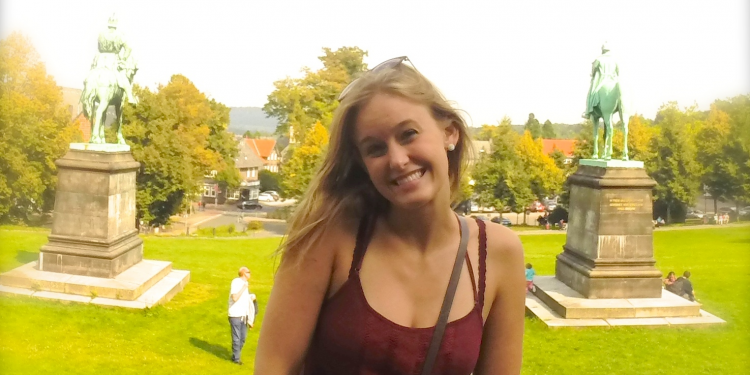

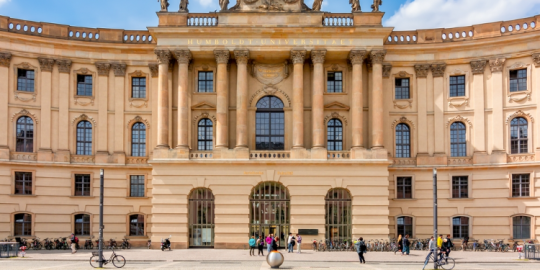


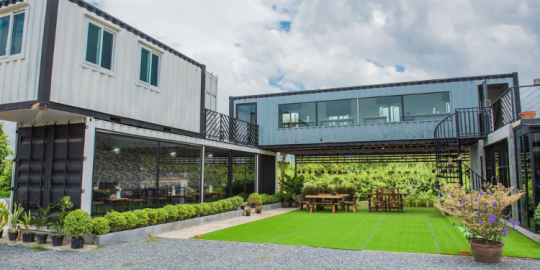
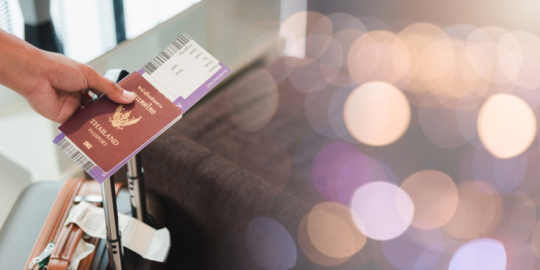





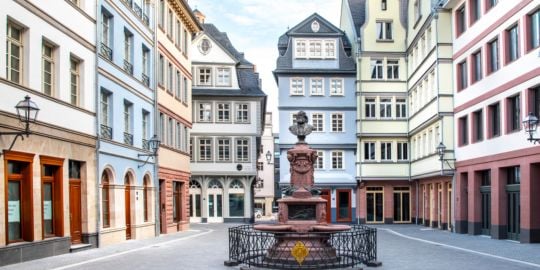




Contact us to be featured in the Interviews section.
Participate